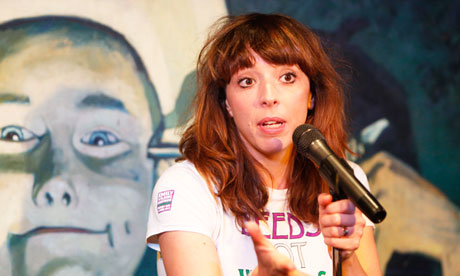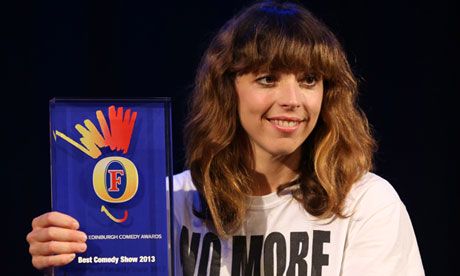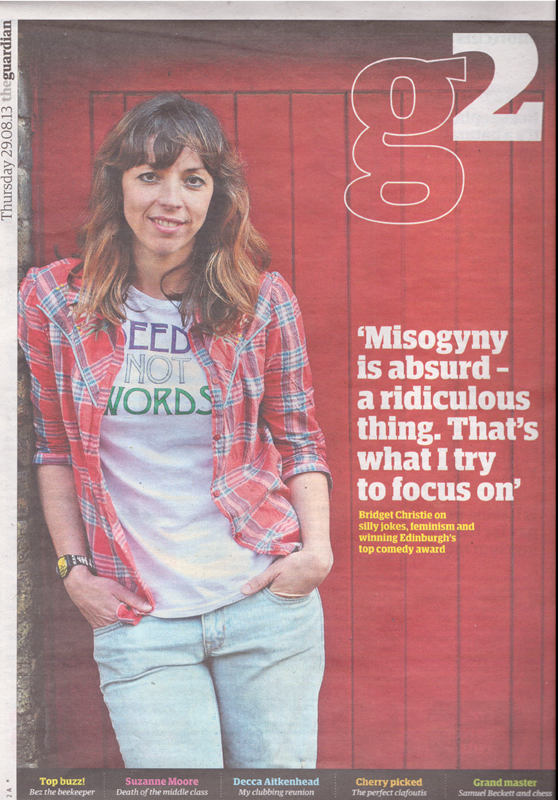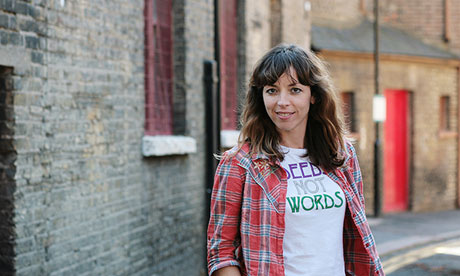A Bic For Her
Bridget Christie: ‘I’ve a long way to go’
The winner of this year's Edinburgh Comedy award is one of our sharpest and most political standups – but reckons she still has a lot to learn. She talks about success, her unorthodox campaign against lads' mags, and why all female comics know that online abuse is nothing new
Written by Rebecca Nicholson in The Guardian on August 28th, 2013
‘I spoke to two policemen yesterday who explained the law to me,” says Bridget Christie, feminist, award-winning comic and law-breaker, with a mischievous look in her eye. There’s a bit in her excellent standup show A Bic for Her in which she describes how she takes lads’ mags and smutty tabloids off supermarket shelves and dumps them in the nearest bin. She’s spent the summer telling an Edinburgh audience exactly when and where she does it and says she’s never once been caught. Is it true? Yes, Christie says, she does it all the time. But she has finally realised that she might get into trouble. “If I name shops then I can be prosecuted. If they don’t know where I’m doing it, then I can’t be. So would you do me a favour? Don’t name the shops. Just say, [I do it] across the country. Up and down the country.”
A Bic for Her is a feminist comedy show. In addition to lads’ mags she talks to the crowd about women in sport, asks why Beyoncé is more popular than the Pakistani schoolgirl Malala Yousafzai, and gets a member of the audience to set up a direct debit to a women’s refuge. On paper, it doesn’t sound hilarious. But live, it is, balancing points that are silly, thoughtful, weird and inspiring with deft structure, sharp lines and a sprinkle of slapstick. As she discusses the fact that Bic really did make a pen “for her”, she holds a regular biro as if struggling with the weight and size of it, and says: “I expect that’s why the Brontës were so shit at writing.”
The run sold out, critics loved it, and last Saturday Christie walked off with the big-deal Foster’s Edinburgh Comedy award for best show of the Fringe, an honour previously bestowed on Frank Skinner, Steve Coogan, Dylan Moran and Russell Kane (since it began in 1981, she’s only the third woman to win it). For its most prominent winners, it has opened the doors to a wider public profile outside the comedy circuit; for others, it’s simply a nice thing to put on posters. What it will do for Christie is not yet known. But when we meet in a cafe near her home in north London, the day after her return from Edinburgh, she is still running it all over in her mind.
“There are so many things you can do with standup, and I think I’ve only just worked that out,” she says, wondering aloud about the structure of a routine and where jokes work and the rhythm and the tone of it, as if she’s still scribbling it all down in a mental notebook. Now 41, she has been doing comedy for 10 years but is near-horrified when I suggest that winning the big prize at Edinburgh means she’s probably cracked it. “Ooh no, I’ve a long way to go,” she says. When Christie is making a more serious point, her voice changes; for the most part, she speaks quickly, in long paragraphs and short sentences, chucking in the odd voice, particularly when she can see she’s making you laugh. But her reaction to winning the Foster is cautious.
“Though I’m extremely grateful and delighted, all that happened was a panel of people thought that [it was the best],” she explains, clarifying the situation, perhaps to herself. “It was good of them to recognise that I was doing something different to what I normally do, but also, it creates as many problems as it solves. So now, hopefully, I won’t be in Hull doing a show to two people; on the other side of that is the fact that there is now a level of expectation upon my shoulders. Before, in Edinburgh, for eight or nine years, people would stumble across me, and they’d go, ooh, oh, that’s not two stars, that’s at least three,” she laughs. “Now, they go, five stars? For this? For this shit?”

That’s not to say she wishes she hadn’t got it. “What was brilliant about it for me was that it gives something quite important a platform,” she says. Christie is thrilled, for example, that she got to wear her No More Page 3 T-shirt to collect the award, and in her acceptance speech, she drew attention to the fact that of the numerous women performing at the fringe this year, she was the only one nominated for the main prize. “I did think very carefully about what I said, because of other female comics. I didn’t want to sound patronising or assume that they would want me to accept it on their behalf. ‘Oh look, I’m up here and I’ve got it, but it’s for all of us’ – I mean, how awful. So that’s why I said: ‘If they don’t mind, I would like, for myself, to accept it on behalf of everybody.'”
Christie came to standup late, at 31, having lived a life that lends itself well to surreal comedy. She grew up in Gloucester, the ninth and final child of Irish parents. “Because I was the ninth, I may have wanted some attention,” she admits. “If there’s a lot of people, by the time you’d got down to the ninth opinion on something, pretty much everyone’s gone to the toilet.” She left school at 15. “I wasn’t naughty or a rebel, I just wanted to work. I wanted to have my own money at a very young age. My dad said to me recently that he never worried about me, considering I left home so young. I was quite sensible.” She went back to take “some” of her exams. “English and drama. I got a good grade for drama and not much else. But then I just lied. My whole working life,” she says, cheerily. “Ooh, I had an amazing CV. I’d never do that in the medical profession, but I suppose for things like office jobs, you can lie, can’t you? Nobody checks.”
During this same period, Christie became a biker. She describes this process matter-of-factly. “You get your test, you buy a bike, you go around with the local Hells Angels. Well, they weren’t Hells Angels. They were called the Wolves Outlaws. We all rode to the Swiss Alps when I was 17.” Lately, she’s been thinking about returning to the leather-clad fold. “I’m quite small, I’m 5ft 3in, but I’ve ridden really big bikes. Cos it’s just about balance really. You’re quite amused by this, aren’t you? So I’d like to have a bike at some point, but we don’t have a garden. If we ever get a house with a drive I want to get a motorbike. An old English one with a sidecar. Pop him in with a little cake and a cup of tea.”
“Him” is Christie’s husband, the comedian Stewart Lee, with whom she has two children. Neither is keen to talk about the other in interviews these days. Lee posted the following plug for her show Housewife Surrealist on Facebook in 2012 : “My wife Bridget Christie, whose main area of interest is being continually referred to as Stewart Lee’s wife everywhere and often by female journalists …”, which does put the female journalist in a bind. When asked recently about being married to a fellow comedian, she batted it away with a joke: “It’s like a morgue. I mean, an atheist and a feminist sharing a house …” Today, she attempts to explain why she’s reluctant to talk about her home life in any great detail. “I’m quite private. I don’t like any fuss.” This is, she says, why her reaction to her Edinburgh win might sound muted. “I suppose that’s why – it’s not that I’m trying to play the whole thing down, but I don’t really like any fuss.”
When she was 23, Christie decided to audition for drama school. “It was something I always wanted to do, but I’m from a working-class background, I always needed my own money, I always needed to work, and I might have thought it wasn’t possible for me.” Nevertheless, through a combination of saving her wages, a grant from Gloucester council and a scholarship, she managed to scrape together the fees and take up her place. “I was temping at the post office in Gloucester when I got the letter through, and I remember thinking, this might change my life,” she says.
She worries that these opportunities don’t exist for the working class now. “It’s not just the arts. People won’t go to university any more. My brilliant niece dropped out of doing politics because she couldn’t afford it. What is going to happen to all these brilliant kids?” In fact, she only came to standup because it was easier to fit evening gigs around her day job – which, in another intriguing chapter of her life, involved working on the Diary desk at the Daily Mail for five years, talking to celebrities at showbiz parties. She turned it into a standup show, My Daily Mail Hell, in 2009. During its Edinburgh run she gave an interview about it in which she said: “I’m not political, I’m silly.”

Clearly something has shifted. A Bic for Her is a political show. But Christie has found her feet by combining the two qualities. “I’ve always been quite silly, so that shouldn’t change. Misogyny is absurd. It’s an absurd, ridiculous thing. I suppose that’s what I try to focus on. I think it’s a good way of it being effective.”
This isn’t the first time feminism has appeared in her work. She used ants as a metaphor for female comedians in 2008’s A Ant and it formed the bulk of last year’s War Donkey. Listeners to her recent Radio 4 show, Bridget Christie Minds the Gap (it’s just been renewed for a second series), will be familiar with the story of her feminist epiphany, which involved a bookshop employee farting in the women’s section. “It was a good metaphor,” she says, but adds that it was the final straw in what had been a particularly toxic period of sexism. She had received a review that implied she was only getting gigs because of her husband, and had experienced some online abuse. “It’s funny now that Stella Creasy has given all this a profile, but female comics have been putting up with it for a long, long time. I’ve had sexual threats, all sorts of things written about me, for years. It is depressing to say that you become immune to it.”
In A Bic for Her, Christie pretends she’s being heckled by a member of the audience (“What’s that? Why are you talking about pens when you’ve got honour killings and sex trafficking and domestic violence and female genital mutilation?”). “I’m almost tricking people into enjoying a show that’s about quite an unfunny subject,” she says. But it’s also a clever device, insulating her from criticism by pre-emptively writing it off. “There is going to be a backlash. All women who have an opinion have negative …” she trails off. “Let alone a feminist. But in a way, it’s sort of funny, and it proves my point.”
Christie thinks that this is a good time to be talking about women’s rights. She says feminism is “in the air” in a way that it wasn’t even a year ago. “We’ve had a lot of high-profile stories in the past six months. Stella Creasy, Mary Beard. Julia Gillard. We’ve all just collectively gone [pulls face]. But as I say in the show, the anger and aggression and hostility come from people who just don’t understand what it is.” She claims she’s not really interested in changing people’s minds. “My objective isn’t to convert people into agreeing with basic human rights. If they don’t believe in those, I can’t help them, can I? In fact there’s a bit in the show where I say, I’m not trying to make feminism funny so that twats change their minds about it.” Yet however much she denies it, it seems she can’t help but want to bring people over to her side just a little bit. “If a show is well-reviewed then people will come, regardless of what it’s about, and hopefully, they’ll think, ‘Yeah, well I’m a feminist then, cos I think those things.’ I’m not saying that we’re all feminists now,” she says, then adds: “Though that would be brilliant.”

Written by Rebecca Nicholson in The Guardian on 28th August 2013.
Filed Under: An Ungrateful Woman, Interview
